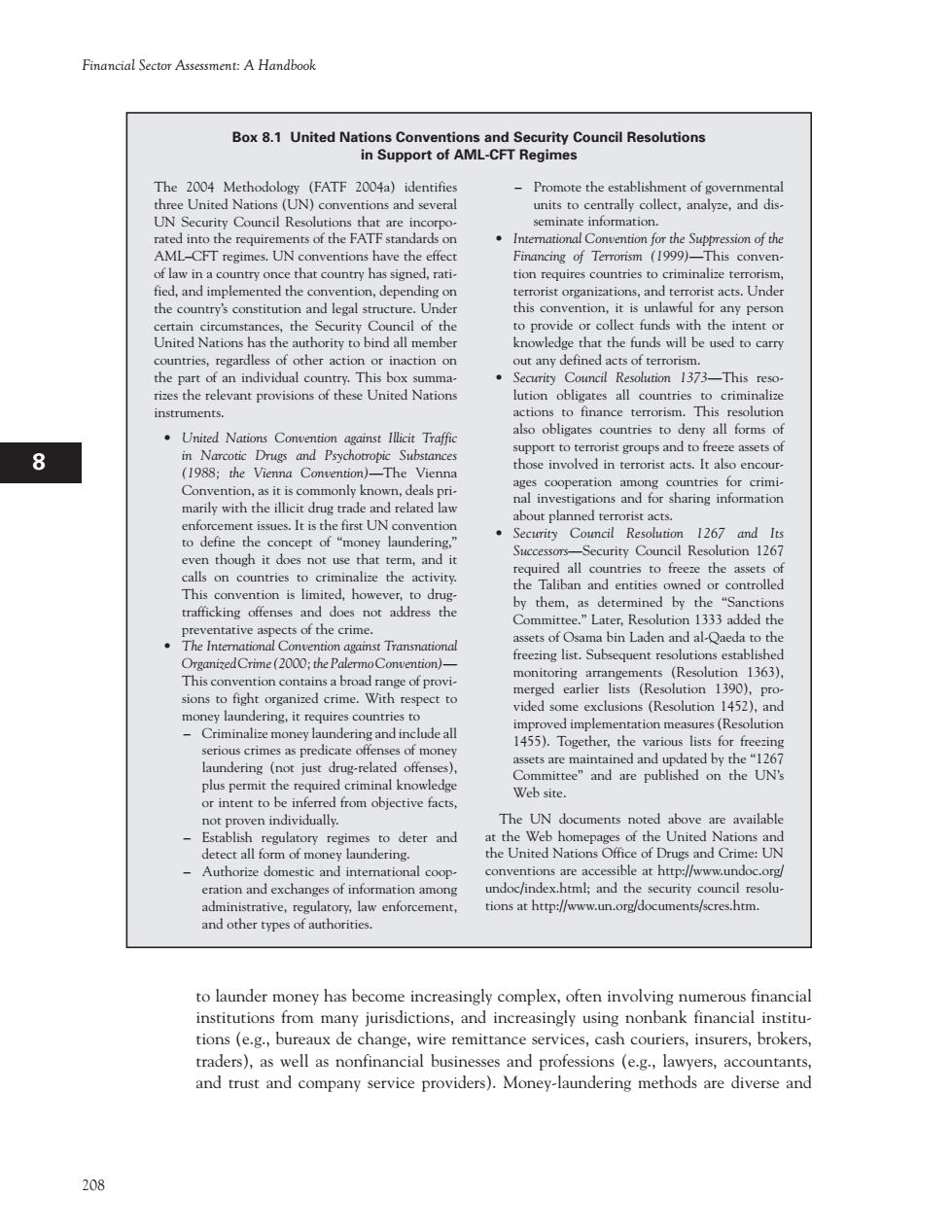正在加载图片...

Financial Sector Assessment A handhook eBoxa1UniadnnscoamcgamegagtnconaRaotioa CFT Regimes The (FATF UN Security Council Resolution tha atior ments of the FAT or the S sion of the This of aw ina try once that country has siged,rati ied and i the c Enoritoganiations,andte e4山 also obligates countries to deny all forms c The Vienna ment first UN conventio about planned terrorist as and the assets aliban and the ed ed eLater.Resolution 1333 added the 1363 ion c ns a b nge of provi lists With ed 1A5 and in lude all impleme list and are published on the UN plus permit the required criminal know or intent to from objective The UN documents noted above are availabl gulatory regi deter and the Web ho andexchanges undoc/index.html;and th w enforcement ecricouncleol to launder money has become increasingly complex,often involving numerous financial institutions from many jurisdictions,and increasingly using nonbank financial institu- tions (e.g.,bureaux de change,wire remittance services,cash couriers,insurers,brokers traders).as well as ponfina cial bus and professions (e.g., and trust and and 208 208 Financial Sector Assessment: A Handbook 1 G F E D C B A 12 11 10 9 8 7 6 5 4 3 2 to launder money has become increasingly complex, often involving numerous financial institutions from many jurisdictions, and increasingly using nonbank financial institutions (e.g., bureaux de change, wire remittance services, cash couriers, insurers, brokers, traders), as well as nonfinancial businesses and professions (e.g., lawyers, accountants, and trust and company service providers). Money-laundering methods are diverse and Box 8.1 United Nations Conventions and Security Council Resolutions in Support of AML-CFT Regimes The 2004 Methodology (FATF 2004a) identifies three United Nations (UN) conventions and several UN Security Council Resolutions that are incorporated into the requirements of the FATF standards on AML–CFT regimes. UN conventions have the effect of law in a country once that country has signed, ratified, and implemented the convention, depending on the country’s constitution and legal structure. Under certain circumstances, the Security Council of the United Nations has the authority to bind all member countries, regardless of other action or inaction on the part of an individual country. This box summarizes the relevant provisions of these United Nations instruments. • United Nations Convention against Illicit Traffic in Narcotic Drugs and Psychotropic Substances (1988; the Vienna Convention)—The Vienna Convention, as it is commonly known, deals primarily with the illicit drug trade and related law enforcement issues. It is the first UN convention to define the concept of “money laundering,” even though it does not use that term, and it calls on countries to criminalize the activity. This convention is limited, however, to drugtrafficking offenses and does not address the preventative aspects of the crime. • The International Convention against Transnational Organized Crime (2000; the Palermo Convention)— This convention contains a broad range of provisions to fight organized crime. With respect to money laundering, it requires countries to – Criminalize money laundering and include all serious crimes as predicate offenses of money laundering (not just drug-related offenses), plus permit the required criminal knowledge or intent to be inferred from objective facts, not proven individually. – Establish regulatory regimes to deter and detect all form of money laundering. – Authorize domestic and international cooperation and exchanges of information among administrative, regulatory, law enforcement, and other types of authorities. – Promote the establishment of governmental units to centrally collect, analyze, and disseminate information. • International Convention for the Suppression of the Financing of Terrorism (1999)—This convention requires countries to criminalize terrorism, terrorist organizations, and terrorist acts. Under this convention, it is unlawful for any person to provide or collect funds with the intent or knowledge that the funds will be used to carry out any defined acts of terrorism. • Security Council Resolution 1373—This resolution obligates all countries to criminalize actions to finance terrorism. This resolution also obligates countries to deny all forms of support to terrorist groups and to freeze assets of those involved in terrorist acts. It also encourages cooperation among countries for criminal investigations and for sharing information about planned terrorist acts. • Security Council Resolution 1267 and Its Successors—Security Council Resolution 1267 required all countries to freeze the assets of the Taliban and entities owned or controlled by them, as determined by the “Sanctions Committee.” Later, Resolution 1333 added the assets of Osama bin Laden and al-Qaeda to the freezing list. Subsequent resolutions established monitoring arrangements (Resolution 1363), merged earlier lists (Resolution 1390), provided some exclusions (Resolution 1452), and improved implementation measures (Resolution 1455). Together, the various lists for freezing assets are maintained and updated by the “1267 Committee” and are published on the UN’s Web site. The UN documents noted above are available at the Web homepages of the United Nations and the United Nations Office of Drugs and Crime: UN conventions are accessible at http://www.undoc.org/ undoc/index.html; and the security council resolutions at http://www.un.org/documents/scres.htm